Unit 6 I’m more outgoing than my sister.(Section A Period 1)
文档属性
| 名称 | Unit 6 I’m more outgoing than my sister.(Section A Period 1) | 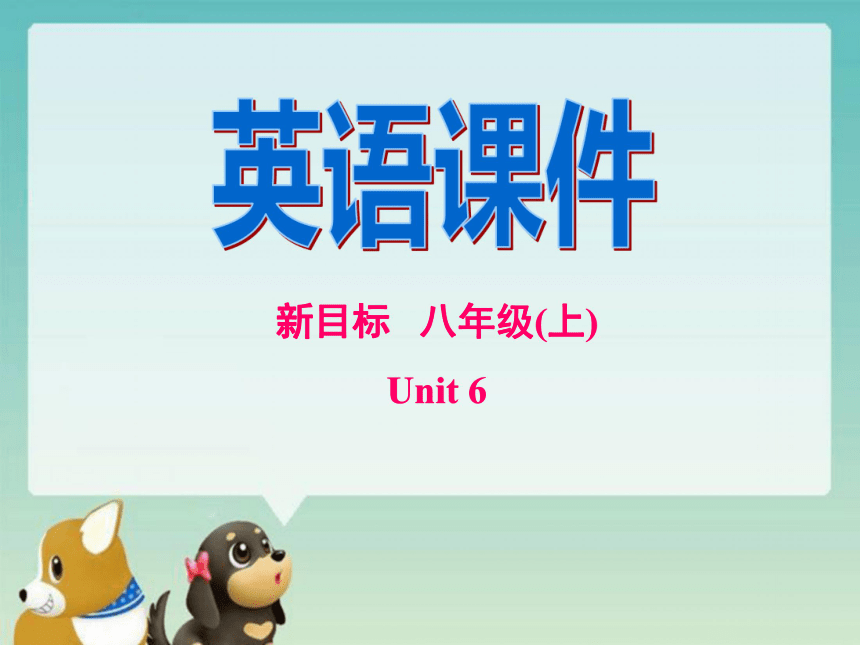 | |
| 格式 | zip | ||
| 文件大小 | 1.7MB | ||
| 资源类型 | 教案 | ||
| 版本资源 | 人教新目标(Go for it)版 | ||
| 科目 | 英语 | ||
| 更新时间 | 2012-10-17 15:16:10 | ||
图片预览

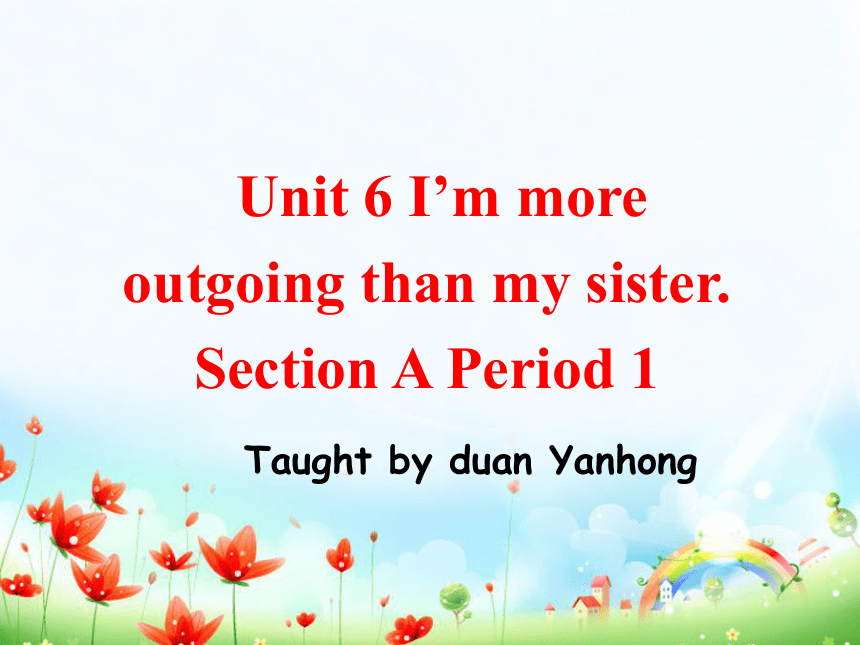

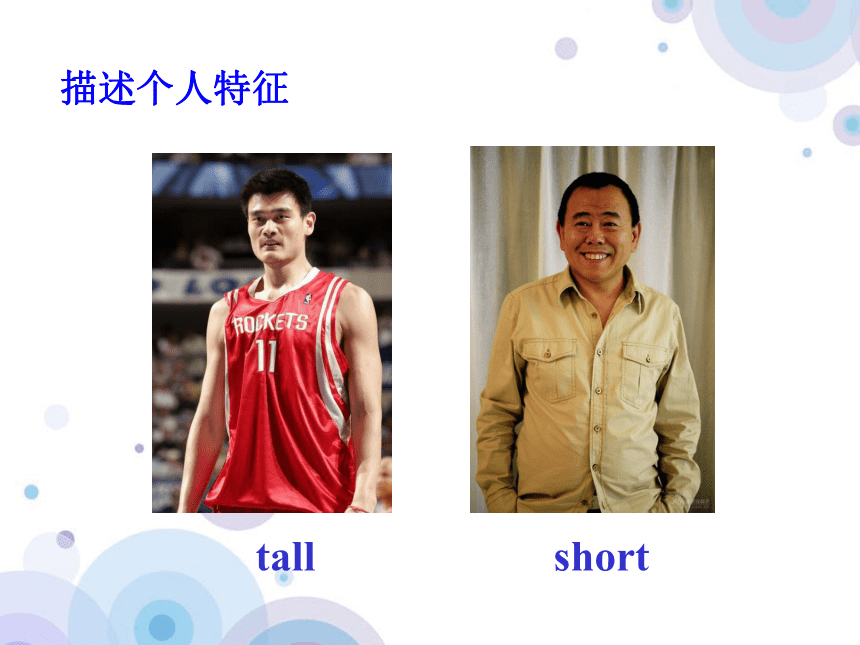
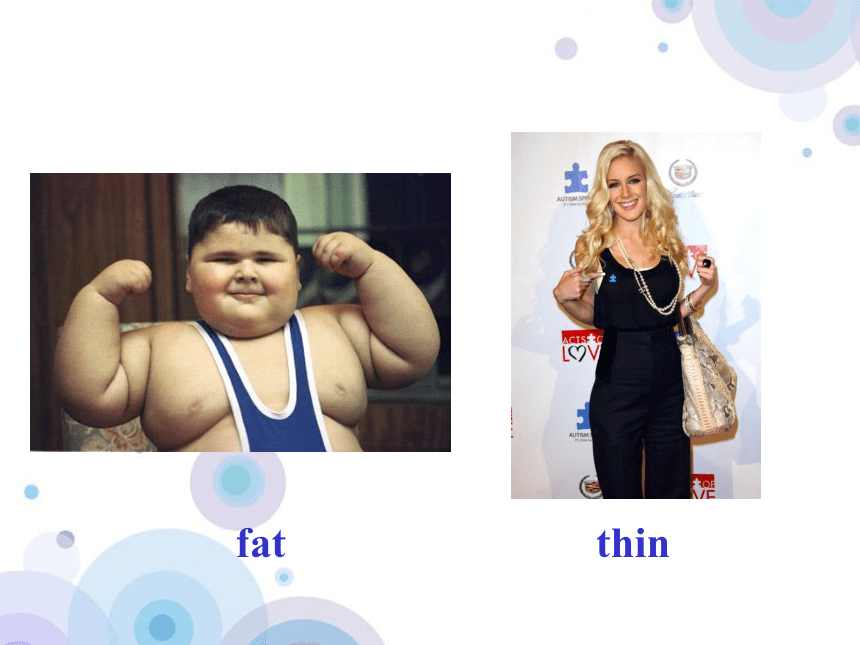
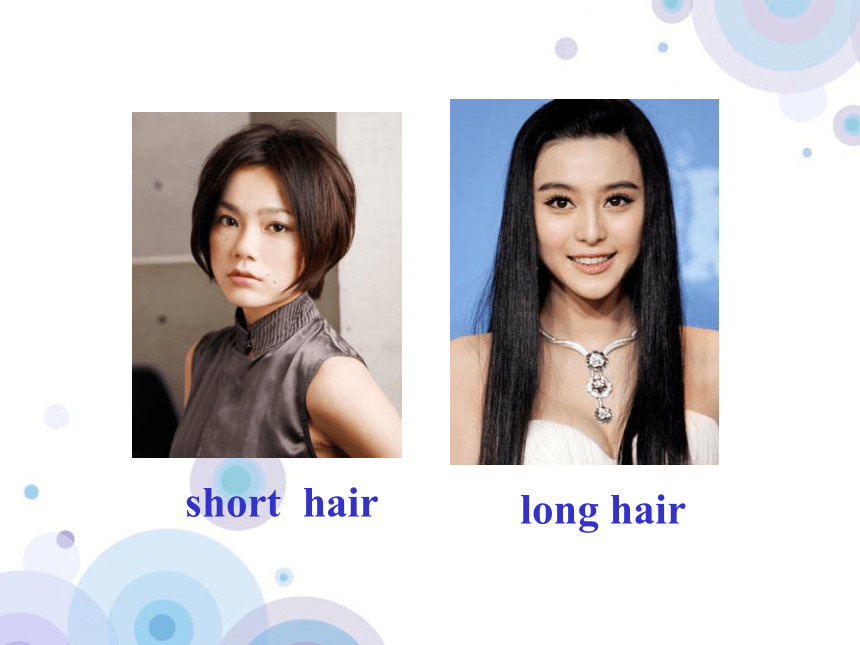
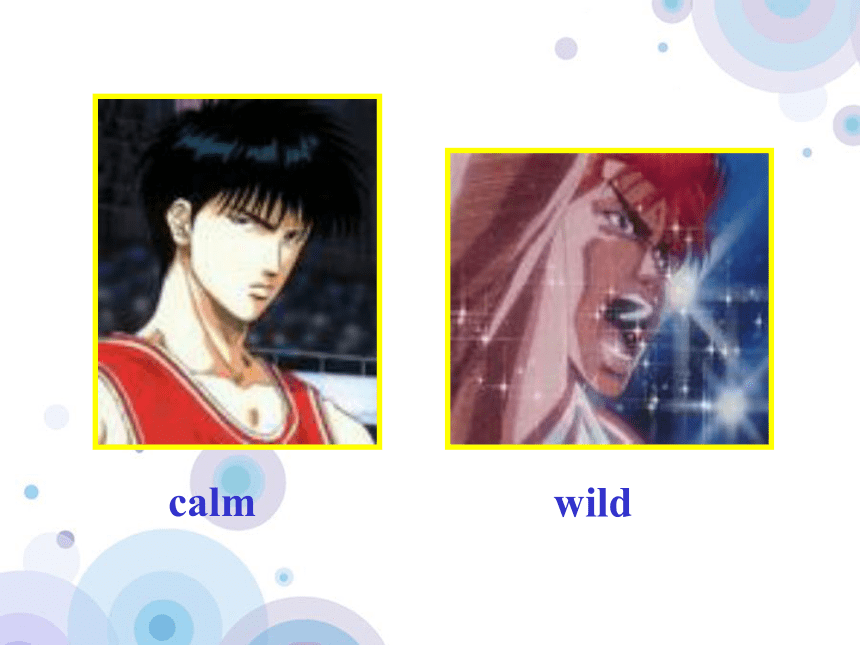
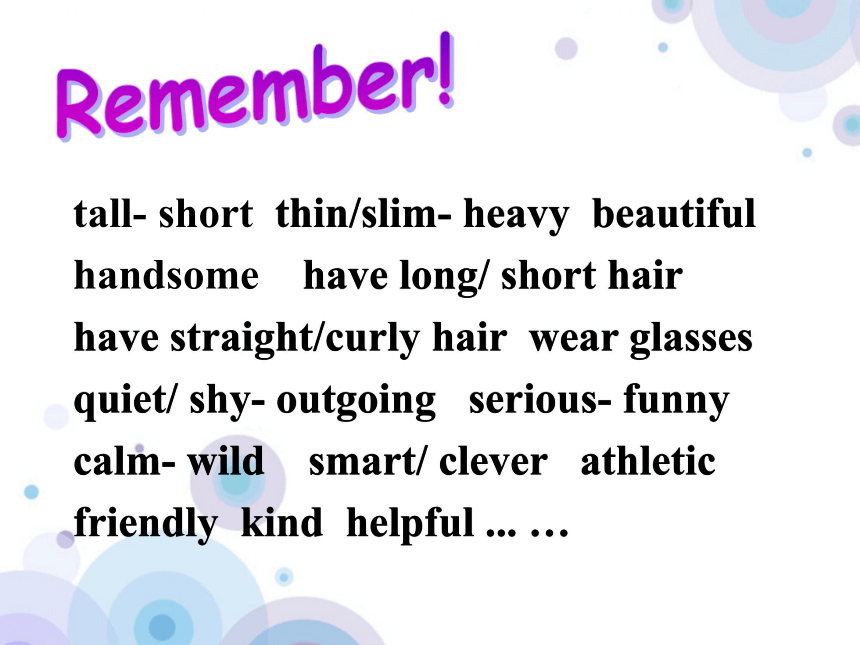
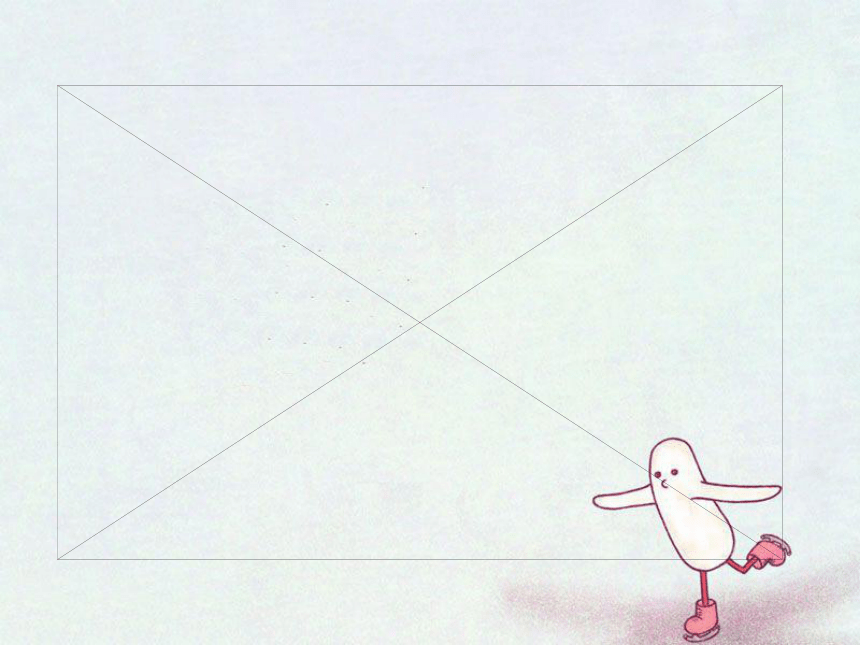
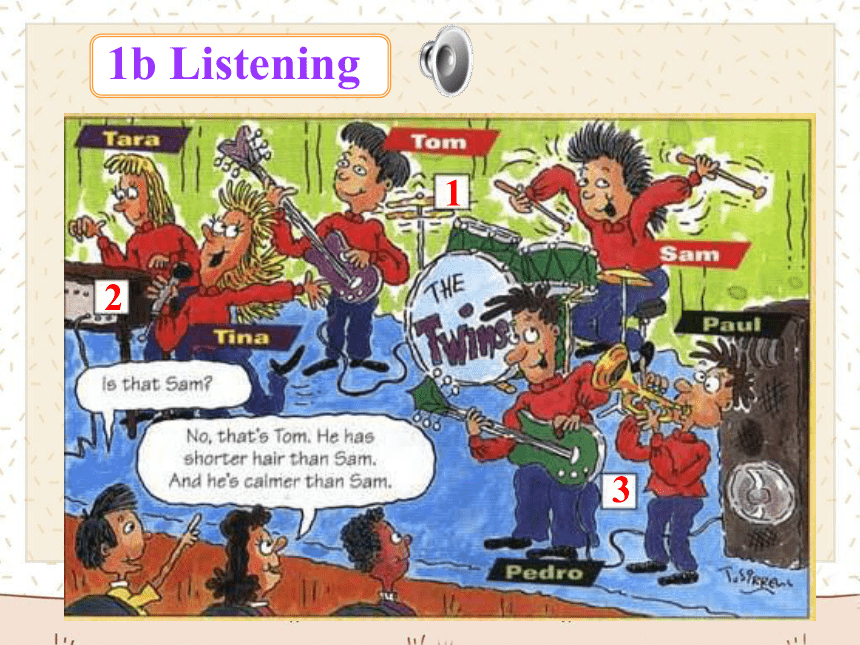
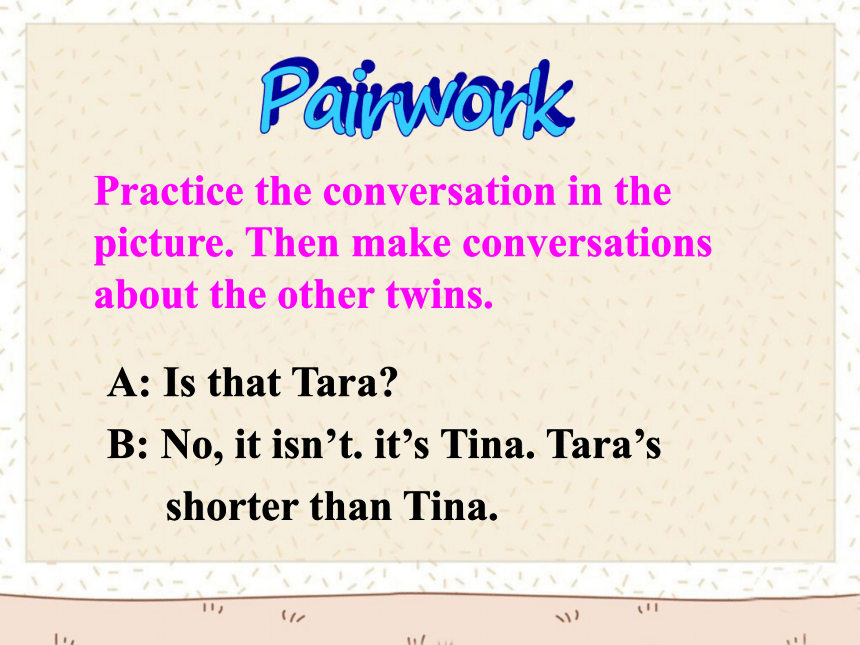
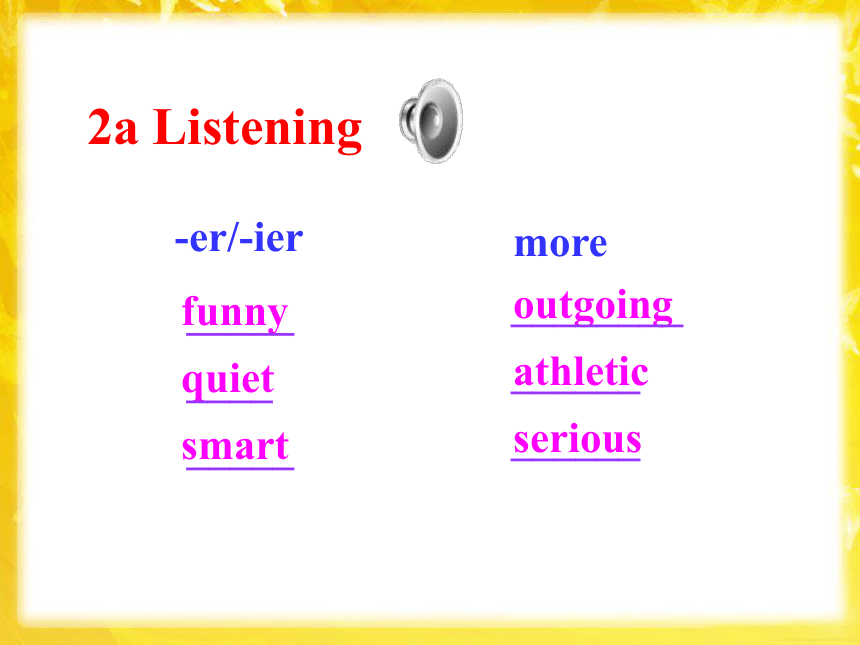
文档简介
(共37张PPT)
新目标 八年级(上) Unit 6
Unit 6 I’m more outgoing than my sister.
Section A Period 1
Taught by duan Yanhong
Tell us the words or phrases about appearance (外貌) and personality (性格) as many as possible.
描述个人特征
tall
short
fat
thin
short hair
long hair
wild
calm
tall- short thin/slim- heavy beautiful handsome have long/ short hair have straight/curly hair wear glasses quiet/ shy- outgoing serious- funny calm- wild smart/ clever athletic friendly kind helpful ... …
1b Listening
1
2
3
Practice the conversation in the picture. Then make conversations about the other twins.
A: Is that Tara
B: No, it isn’t. it’s Tina. Tara’s shorter than Tina.
2a Listening
-er/-ier
funny
quiet
smart
outgoing
athletic
serious
more
_____
____
_____
________
______
______
Fill in the charts.
2b Listening
Tina is …
Tara is …
funnier
more outgoing
more athletic
more serious
quieter
smarter
形容词和副词的比较级和最高级。
大多数形容词和副词有三个等级:原级、比较级、最高级。
Grammar
构成的不规则变化:
eg: good / well – better – best
bad / badly – worse – worst
many / much – more – most
little – less – least
far – farther / further – farthest /
furthest
构成的规则变化:
单音节词和少数双音节词一般在词尾加 — er 或 — est
eg.
cold – colder – coldest
nice — nicer – nicest
重读闭音节词末尾只有一个辅音字 母时, 先双写这个辅音字母, 再加-er或- est。
big – bigger – biggest
thin – thinner – thinnest
以“辅音字母+ y”结尾的双音节词,先改y为i, 再加-er或-est。
eg. easy – easier – easiest
happy – happier – happiest
多音节词和部分双音节词在词前加
more或 most。
eg. delicious – more delicious
– most delicious
interesting – more interesting
– most interesting
用法:
比较级
表示两者 (人或事物) 的比较。
eg. I am taller than Tom.
My dress is more beautiful
than hers.
最高级
表示三者或三者以上 (人或事物 ) 的比较, 其中有一个在某一方面超过其他几个时, 用最高级。最高级的前面一般要加定冠词 -the, 后面可带 of ( in )短语来说明比较的范围。
e.g. She is the youngest in the class.
Jason is the tallest of the three.
Whose handwriting is the best of
all
在形容词比较级前还可用much, even, still, a little来修饰, 表示“……的多”, “甚至……”, “更……”, “……一些”。
e.g. This city is much more beautiful
than before.
She’s a little more outgoing than me.
It’s a little colder today.
“比较级+and+比较级”意为“越来越…” 。多音节比较级用“more and more+形容词原级”形式。
It’s getting worse and worse.
The group became more and more
popular.
“Which / Who is + 比较级……?”比较A、B两事物, 问其中哪一个较……时用此句型。
e.g. Which T-shirt is nicer, this one
or that one
Who is more active, Mary or
Kate
Which one is more popular among students, going to concerts or going to movies
calmer wilder
nicer finer
fatter thinner
funnier heavier
more outgoing more athletic
1.一般在词尾加-er
2.以字母e结尾的词加-r
3.重读闭音节词只有一个辅音字母时,先双写辅音字母再加-er
4.以 辅音字母+y结尾的双音节词,先把“y”改为“i”,再加-er
5.多音节词和部分双音节词在词前加more
形容词比较级变化规则
使用形容词比较级时需注意以下几点:
◎than后面接代词时,一般要用主格形式,但在口语中也可使用宾格形式。 例如:
My brother is taller than I / me. 我弟弟比我高。
◎当需要表示一方超过另一方的程度时,可以用much, a lot, a little, a bit, even, still等来修饰形容词比较级。注意:比较级不能用very, so, too, quite等修饰。
例如:
He is much more serious than Sam. 他比萨姆严肃得多。
◎形容词比较级后面往往用连词than连接另一个比较的人或事物,但在上下文明确的情况下,形容词比较级可单独使用。例如:
My sister is tall, but my aunt is taller.
我姐姐个子高,但我姑姑个子更高。
超级变变变:填空
short safer
better happy
excited colder
worse little
hot large
healthier serious
shorter
good/well
more excited
bad/badly/ill
hotter
healthy
safe
happier
cold
less
more serious
larger
1.If you want to be thinner and healthier, you’d better eat ____food and take ____exercise.
more, fewer B. more, less
C. fewer, more D. less, more
Practice
2. He is ___of the two boys.
tall B. taller
C. tallest D. the taller
3.He’s not so ____as his brother.
strong B. stronger
C. the stronger D. the strongest
4. Mum, this T-shirt is much too small for me. Would you buy me a ____one
good B. better
C. large D. larger
5.Which do you like ____, tea or coffee
good B. better
C. best D. the better
Homework
Review the grammar box.
Preview the reading article on page 33.
Thank you for listening!
新目标 八年级(上) Unit 6
Unit 6 I’m more outgoing than my sister.
Section A Period 1
Taught by duan Yanhong
Tell us the words or phrases about appearance (外貌) and personality (性格) as many as possible.
描述个人特征
tall
short
fat
thin
short hair
long hair
wild
calm
tall- short thin/slim- heavy beautiful handsome have long/ short hair have straight/curly hair wear glasses quiet/ shy- outgoing serious- funny calm- wild smart/ clever athletic friendly kind helpful ... …
1b Listening
1
2
3
Practice the conversation in the picture. Then make conversations about the other twins.
A: Is that Tara
B: No, it isn’t. it’s Tina. Tara’s shorter than Tina.
2a Listening
-er/-ier
funny
quiet
smart
outgoing
athletic
serious
more
_____
____
_____
________
______
______
Fill in the charts.
2b Listening
Tina is …
Tara is …
funnier
more outgoing
more athletic
more serious
quieter
smarter
形容词和副词的比较级和最高级。
大多数形容词和副词有三个等级:原级、比较级、最高级。
Grammar
构成的不规则变化:
eg: good / well – better – best
bad / badly – worse – worst
many / much – more – most
little – less – least
far – farther / further – farthest /
furthest
构成的规则变化:
单音节词和少数双音节词一般在词尾加 — er 或 — est
eg.
cold – colder – coldest
nice — nicer – nicest
重读闭音节词末尾只有一个辅音字 母时, 先双写这个辅音字母, 再加-er或- est。
big – bigger – biggest
thin – thinner – thinnest
以“辅音字母+ y”结尾的双音节词,先改y为i, 再加-er或-est。
eg. easy – easier – easiest
happy – happier – happiest
多音节词和部分双音节词在词前加
more或 most。
eg. delicious – more delicious
– most delicious
interesting – more interesting
– most interesting
用法:
比较级
表示两者 (人或事物) 的比较。
eg. I am taller than Tom.
My dress is more beautiful
than hers.
最高级
表示三者或三者以上 (人或事物 ) 的比较, 其中有一个在某一方面超过其他几个时, 用最高级。最高级的前面一般要加定冠词 -the, 后面可带 of ( in )短语来说明比较的范围。
e.g. She is the youngest in the class.
Jason is the tallest of the three.
Whose handwriting is the best of
all
在形容词比较级前还可用much, even, still, a little来修饰, 表示“……的多”, “甚至……”, “更……”, “……一些”。
e.g. This city is much more beautiful
than before.
She’s a little more outgoing than me.
It’s a little colder today.
“比较级+and+比较级”意为“越来越…” 。多音节比较级用“more and more+形容词原级”形式。
It’s getting worse and worse.
The group became more and more
popular.
“Which / Who is + 比较级……?”比较A、B两事物, 问其中哪一个较……时用此句型。
e.g. Which T-shirt is nicer, this one
or that one
Who is more active, Mary or
Kate
Which one is more popular among students, going to concerts or going to movies
calmer wilder
nicer finer
fatter thinner
funnier heavier
more outgoing more athletic
1.一般在词尾加-er
2.以字母e结尾的词加-r
3.重读闭音节词只有一个辅音字母时,先双写辅音字母再加-er
4.以 辅音字母+y结尾的双音节词,先把“y”改为“i”,再加-er
5.多音节词和部分双音节词在词前加more
形容词比较级变化规则
使用形容词比较级时需注意以下几点:
◎than后面接代词时,一般要用主格形式,但在口语中也可使用宾格形式。 例如:
My brother is taller than I / me. 我弟弟比我高。
◎当需要表示一方超过另一方的程度时,可以用much, a lot, a little, a bit, even, still等来修饰形容词比较级。注意:比较级不能用very, so, too, quite等修饰。
例如:
He is much more serious than Sam. 他比萨姆严肃得多。
◎形容词比较级后面往往用连词than连接另一个比较的人或事物,但在上下文明确的情况下,形容词比较级可单独使用。例如:
My sister is tall, but my aunt is taller.
我姐姐个子高,但我姑姑个子更高。
超级变变变:填空
short safer
better happy
excited colder
worse little
hot large
healthier serious
shorter
good/well
more excited
bad/badly/ill
hotter
healthy
safe
happier
cold
less
more serious
larger
1.If you want to be thinner and healthier, you’d better eat ____food and take ____exercise.
more, fewer B. more, less
C. fewer, more D. less, more
Practice
2. He is ___of the two boys.
tall B. taller
C. tallest D. the taller
3.He’s not so ____as his brother.
strong B. stronger
C. the stronger D. the strongest
4. Mum, this T-shirt is much too small for me. Would you buy me a ____one
good B. better
C. large D. larger
5.Which do you like ____, tea or coffee
good B. better
C. best D. the better
Homework
Review the grammar box.
Preview the reading article on page 33.
Thank you for listening!
同课章节目录
- Unit 1 Where did you go on vacation?
- Section A
- Section B
- Unit 2 How often do you exercise?
- Section A
- Section B
- Unit 3 I'm more outgoing than my sister.
- Section A
- Section B
- Unit 4 What's the best movie theater?
- Section A
- Section B
- Unit 5 Do you want to watch a game show?
- Section A
- Section B
- Unit 6 I'm going to study computer science.
- Section A
- Section B
- Unit 7 Will people have robots?
- Section A
- Section B
- Unit 8 How do you make a banana milk shake?
- Section A
- Section B
- Unit 9 Can you come to my party?
- Section A
- Section B
- Unit 10 If you go to the party, you'll have a grea
- Section A
- Section B
